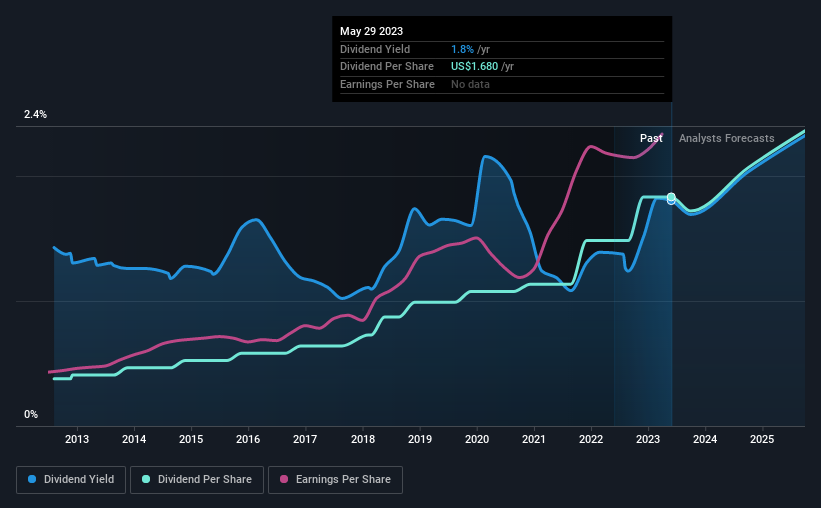- United States
- /
- Capital Markets
- /
- NYSE:RJF
Raymond James Financial (NYSE:RJF) Will Pay A Larger Dividend Than Last Year At $0.42

Raymond James Financial, Inc. (NYSE:RJF) will increase its dividend from last year's comparable payment on the 17th of July to $0.42. Despite this raise, the dividend yield of 1.8% is only a modest boost to shareholder returns.
View our latest analysis for Raymond James Financial
Raymond James Financial's Earnings Easily Cover The Distributions
If it is predictable over a long period, even low dividend yields can be attractive. Based on the last payment, Raymond James Financial was earning enough to cover the dividend, but free cash flows weren't positive. We think that cash flows should take priority over earnings, so this is definitely a worry for the dividend going forward.
Looking forward, earnings per share is forecast to rise by 32.4% over the next year. If the dividend continues along recent trends, we estimate the payout ratio will be 18%, which is in the range that makes us comfortable with the sustainability of the dividend.

Raymond James Financial Has A Solid Track Record
The company has been paying a dividend for a long time, and it has been quite stable which gives us confidence in the future dividend potential. The dividend has gone from an annual total of $0.347 in 2013 to the most recent total annual payment of $1.68. This implies that the company grew its distributions at a yearly rate of about 17% over that duration. Rapidly growing dividends for a long time is a very valuable feature for an income stock.
The Dividend Looks Likely To Grow
Some investors will be chomping at the bit to buy some of the company's stock based on its dividend history. Raymond James Financial has seen EPS rising for the last five years, at 18% per annum. With a decent amount of growth and a low payout ratio, we think this bodes well for Raymond James Financial's prospects of growing its dividend payments in the future.
In Summary
Overall, we always like to see the dividend being raised, but we don't think Raymond James Financial will make a great income stock. With cash flows lacking, it is difficult to see how the company can sustain a dividend payment. This company is not in the top tier of income providing stocks.
It's important to note that companies having a consistent dividend policy will generate greater investor confidence than those having an erratic one. Meanwhile, despite the importance of dividend payments, they are not the only factors our readers should know when assessing a company. Taking the debate a bit further, we've identified 1 warning sign for Raymond James Financial that investors need to be conscious of moving forward. If you are a dividend investor, you might also want to look at our curated list of high yield dividend stocks.
New: AI Stock Screener & Alerts
Our new AI Stock Screener scans the market every day to uncover opportunities.
• Dividend Powerhouses (3%+ Yield)
• Undervalued Small Caps with Insider Buying
• High growth Tech and AI Companies
Or build your own from over 50 metrics.
Have feedback on this article? Concerned about the content? Get in touch with us directly. Alternatively, email editorial-team (at) simplywallst.com.
This article by Simply Wall St is general in nature. We provide commentary based on historical data and analyst forecasts only using an unbiased methodology and our articles are not intended to be financial advice. It does not constitute a recommendation to buy or sell any stock, and does not take account of your objectives, or your financial situation. We aim to bring you long-term focused analysis driven by fundamental data. Note that our analysis may not factor in the latest price-sensitive company announcements or qualitative material. Simply Wall St has no position in any stocks mentioned.
About NYSE:RJF
Raymond James Financial
A diversified financial services company, provides private client group, capital markets, asset management, banking, and other services to individuals, corporations, and municipalities in the United States, Canada, and Europe.
Undervalued with solid track record and pays a dividend.


